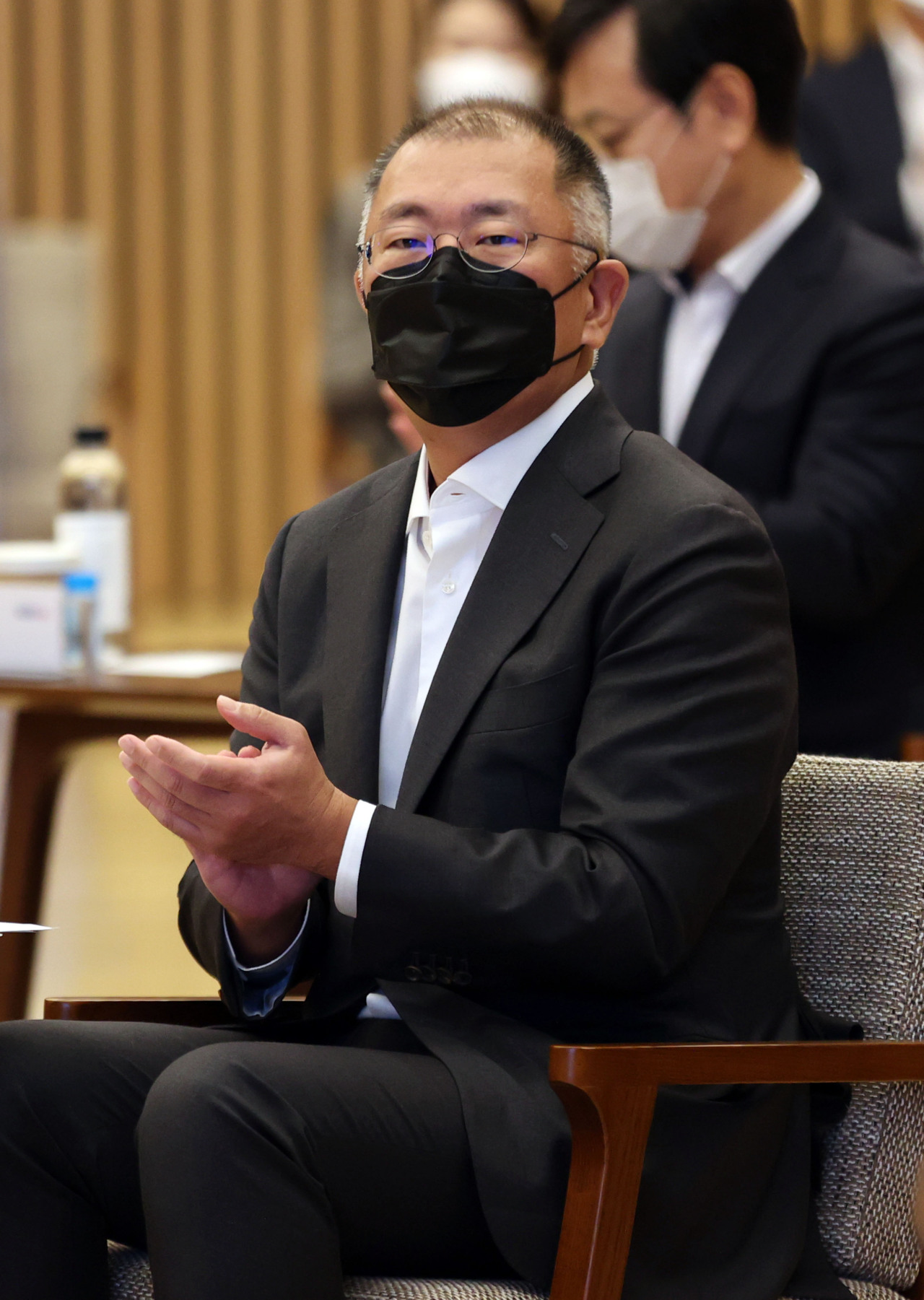Hyundai Motor Group Chairman Chung Euisun made it official for the first time that the company plans to manufacture electric vehicles in the US, but questions are being raised over why the South Korean auto giant is not moving fast to do so.
“Not starting next year, but we are planning to (make EVs in the US), so still looking for a timing,” said Chung, crossing a line against market speculation that the automaker’s EV production in its US factories is imminent.
“Portions of EVs (in Hyundai’s product lineup) will increase by 2040, but things like battery and semiconductor have to be solved (for EV production), and everything is proceeding as planned,” he told reporters at a government-led job creation campaign held in Ilsan, Gyeonggi, on Monday.
In May, during a roundtable meeting with President Moon Jae-in ahead of his summit with US President Joe Biden in Washington, Hyundai Motor announced a plan to invest $7.4 billion in expanding the electric vehicle production and recharging infrastructure in the US.
The market speculated that the majority of the investment will be put to manufacture Hyundai’s flagship EV models including Ioniq 5 and EV6 there, cementing its position in the US EV market amid Joe Biden administration’s push for a major $1 trillion infrastructure package. It includes incentivizing electric car purchases to nudge half of US drivers into EVs by 2030.
Market experts view that the US EV market will grow to run 2.4 million cars without combustion engines in 2025, double by 2030 and triple by 2035 amid global efforts to cut exhaust emissions. Washington has also been pushing to finalize a plan to grant a $4,500 tax credit for EVs assembled by only American companies with union labor there, not with a foreign automaker.
But this has put a halt on the Korean carmaker’s plan to produce EVs in its manufacturing plants in Alabama and Georgia.
The automaker’s North American chief Jose Munoz said in an interview with a US media outlet last week that the proposed $4,500 incentive advantage is a huge issue to consider.
Saying that it is “questionable” whether to proceed with investment for EV production in the US, Munoz said the subsidy for US EV makers with registered labor union creates disparity for foreign automakers.
Currently, the South Korean carmaker’s Alabama and Georgia factories are operated based on a non-union workforce. Only companies like GM, Ford and Stellantis have labor unions approved by the country’s United Auto Workers.
Local industry believes that Hyundai Motor will be put up against unfair competition when Biden administration executes the subsidy scheme.
“Non-US companies are often put on a different starting line in spite of their huge investment in the US, as well as their contribution to a job creation there,” said an industry insider, adding that it is inevitable for foreign companies to adjust their production and investment plan to save costs when it comes to business expansion in the US.
Meanwhile, Chung made it clear on Monday that the automaker will outsource batteries for its EV models, in contrast to other global automaker’s rush to internalize battery-making amid supply crunch.
“We could study battery cells together (with suppliers) but the production will be done from the supplier side,” Chung said.
Through three rounds of contracts since 2019, the automaker managed to secure 35 trillion won-worth batteries for its BEV models from local producers like SK Innovation, LG Energy Solution and Chinese company CATL. These batteries will be put to some 2.5 million BEV models manufactured in Korea by 2025.
Market experts viewed that as major EV manufacturers also ramp up production of electric cars, it will be inevitable for local carmakers to feel the squeeze to secure batteries.
According to the analysis firm SNE Research, the battery supply in the US will intensify in the future with 171 GWh in 2023, 312 GWh in 2025 and 854 GHw in 2030. As of last year, the US battery supply was at 39 GWH, while the demand was at 63 GWh.
Tax benefits are also a big hindrance.
According to United States–Mexico–Canada Agreement, EV makers that use 75 percent of their major auto parts produced by US makers can receive a no-tax benefit. Since a battery accounts for 40 percent of the EV structure, automakers have no other option but to either produce battery cells locally, or find a local partner for efficient procurement.
“Battery procurement is probably the most essential part for the US production (of EVs). But a race among carmakers to find a supply may hinder the automaker’s plan to immediately start producing EVs in the US,” said professor Kim Pil-soo of automotive engineering from Daelim University.
Otherwise, it is highly likely for Hyundai Motor Group to work together with Korean battery makers in the US, like it did with LG Energy Solution in July to establish a joint venture in Indonesia to manufacture battery cells for BEVs. The group and LG Energy Solution announced a plan to invest a total of $1.1 billion into the joint venture, each owning a 50 percent ownership stake.
By Kim Da-sol (
ddd@heraldcorp.com)








